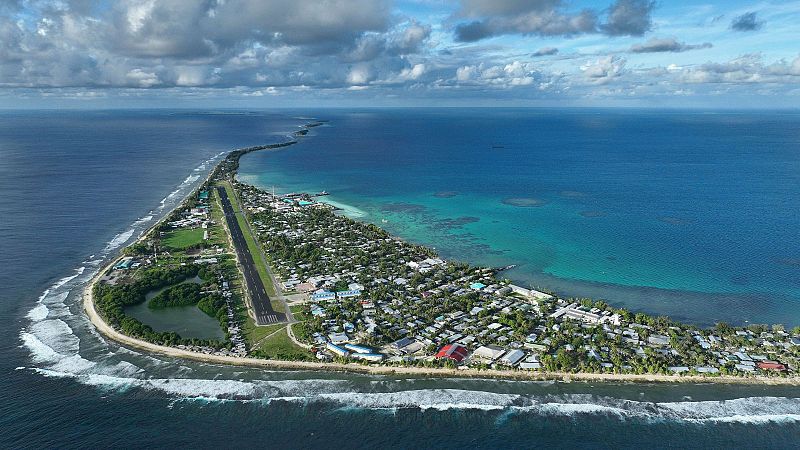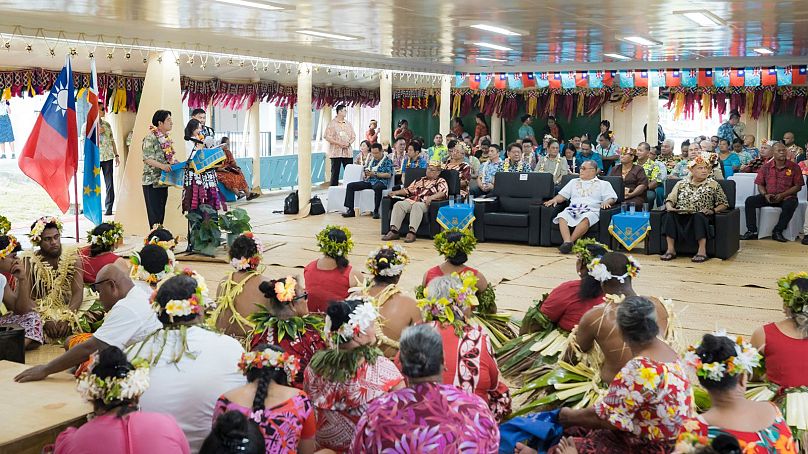
More than a third of people from the Pacific island nation of Tuvalu are seeking to move to Australia through an unprecedented climate visa scheme that opened last week.
Signed by the two countries in 2023, the Falepili Union provides a pathway for Tuvaluans to live, work and study in their larger neighbour, as sea-level rise threatens to engulf their home.
A ballot for visas that opened on 16 June has already seen 1,124 primary registrations as of this morning (27 June), according to Australia’s Department of Home Affairs. That rises to a total of 4,052 people when family members of the primary applicant are included.
That’s well above the 280 limit Australia is offering each year, and represents a sizeable proportion of Tuvalu’s roughly 11,000-strong population.
“It is not surprising that the response is so high,” says James Ellsmoor, CEO of Island Innovation, a consultancy focused on sustainable development for small island states. “I think it is worth noting that there is a limited set of visas available every year, which will limit a major migration event.”
The high number of applicants is likely pushed by two factors: the economy and climate change, he adds.
Why are people looking to leave Tuvalu?
A tiny constellation between Australia and Hawaii in the South Pacific, Tuvalu comprises nine palm-fringed reef islands and coral atolls. Two of its coral atolls have already almost disappeared beneath the waves, as human-caused climate change melts frozen parts of the world and heats the ocean, causing it to expand and rise.
"In Tuvalu, the bond between people, land, and culture is unbreakable. For its people, home is not just where they live - it is who they are. Leaving is not what they want,” says Kamal Amakrane, managing director of the UN's Global Centre for Climate Mobility (GCCM). “Yet climate change is rewriting the future.”
Much of Tuvalu’s land area could fall beneath high tide by 2050, a NASA report from 2023 predicts. And it’s not just sea-level rise that threatens this beautiful nation; climate change is also increasing the frequency and severity of storms, bleaching the corals on which its fisheries depend, and pushing saltwater into freshwater sources.
“From a climate standpoint, the Falepili Mobility Pathway represents a failure in international climate efforts. We are actively failing Tuvalu, we are actively failing island communities,” says Ellsmoor.
“The Pathway, while an impressive show of bilateral policymaking and international solidarity, is a deeply saddening reality. We are talking about an entire sovereign nation and its citizens at risk of losing their physical communities and cultural heritage, through no fault of their own.”
A groundbreaking climate mobility pact
In Tuvaluan, ‘Falepili’ refers to close neighbours. When the pact was announced in November 2023, Australia was praised for the respectful terms of its neighbourliness.
“Response must be anchored in foresight and respect, ensuring that climate mobility is rooted in safety, dignity, and human rights,” says Amakrane. “The Tuvalu–Australia Falepili Union Treaty offers a hopeful model - a promise of partnership, grounded in trust and shared responsibility.”
While providing a “special human mobility pathway”, the deal recognises “the desire of Tuvalu's people to continue to live in their territory where possible and Tuvalu's deep, ancestral connections to land and sea.” It enjoins Australia to help protect Tuvaluans’ right to stay, and to support them to adapt to climate change, noting that tech opportunities are progressing.
“I like to think of it as a bridge, to connect the opportunities that we Tuvaluans aren’t able to get,” Kalita “Titi” Homasi, a Tuvaluan youth representative at COP27 told us. “Australia is a bridge and even if people choose to go, I feel like they will always have the need to return.”
Another part of the pact, which came into force last August, obliges Tuvalu to mutually agree with Australia on any involvement with another state on security and defence matters - widely seen as a measure to block China’s influence in the region.

What does it mean for Tuvalu?
After the inaugural ballot closes on 18 July, a random selection process will take place between 25 July and 25 January, Australia’s Home Affairs office explains. Ballot registrants who are selected to apply for the ‘Pacific Engagement (subclass 192) – Treaty stream’ visa will then be eligible to make an application.
As well as being able to live, study and work in Australia, successful applicants will have access to Australian education, health, and key income and family support on arrival.
Tuvalu has the world’s smallest economy - with its GDP sitting at $63 million (€58mn) in 2023 according to the World Bank - largely founded on fisheries and international grants. Youth unemployment is high, Ellsmoor notes, with few opportunities for job creation, and currently many sectors are threatened by the climate crisis.
“The Falepili Mobility Pathway provides an opportunity for Tuvaluans to work and reinvest back into the country through remittances. In Pacific nations, remittances can represent 15-40 per cent of GDP - for Tuvalu’s economy, even modest increases become transformational,” he says.
Paired with ambitious climate adaptation policies, the remittances could pave the way for a more sustainable economic future. But the existential challenge to Tuvalu and other low-lying island nations remains.
“With COP30 just around the corner, this needs to be a wake-up call for governments,” says Ellsmoor. “What do we have to show for three decades of negotiations?
“The first example of internationally-sanctioned climate migration from a small island developing state to a larger regional power which has built its economy on extractive activities, a country which shows little signs of ambition or interest in ensuring this does not continue to happen despite bidding to host COP31 which it intends to label as the ‘Pacific COP’.”







